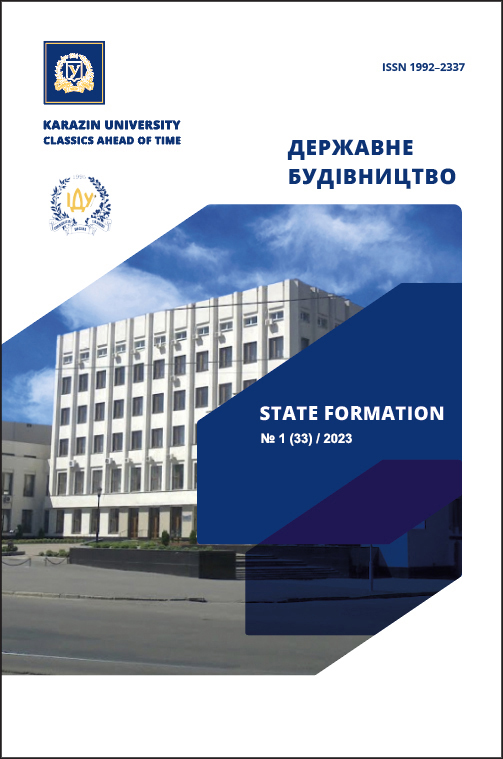DEMOCRATIC GUIDELINES FOR PUBLIC POLICY ACTORS IN THE CONTEXT OF TRANSFORMATIONS OF SOCIETY
Abstract
The article studies the issue of improving the democratic guidelines for public policy actors in the context of social transformations, taking into account the risks of wartime.
While investigating the theoretical approaches to the analysis of the "public policy" concept, it has been found that public policy is a conscious and purposeful regulation of state affairs and common resources by the state and society. A public policy, the essence of which is public activity, has been also considered. The latter is understood to mean the activity of political and non-political actors represented in the public sphere, who through interaction seek to see their own interest fulfilled. It has been substantiated that the problem of shaping the democratic guidelines for the public policy actors is solved due to the identification of the subjective status of persons who are active participants in the democratic development of society, as well as due to the identification of the form of implementation of democratic principles and views in the political and legal activities of a person, satisfaction of the need to exercise political rights and the need to fulfil political obligations.
The phenomenon of modern democracies and the reasons for its vulnerability have been considered. The ways to support a sustainable political and democratic process have been substantiated, in particular, legal confirmation and legislative provision of political rights of citizens.
Two institutional dimensions of the political and legal phenomenon of responsibility have been considered: the responsibility of the state and its bodies to a person (an individual and a citizen) when its rights and freedoms are violated and in compensation for the damage caused to it; the responsibility of an individual to the state, arising both in the case of an offense committed and when being implicit in each socially significant act of the person.
It has been proved that representative democracy and participatory politics involve not only drastic changes in the political consciousness of the masses, but also the development of a new type of political actors who perceive their own political rights combined with responsibilities, who need to be responsible citizens, who recognize the power of their voices in decision-making by the authorities.
Involvement in public affairs should become an imperative of a democratic culture of political behaviour of Ukrainians, built on the foundation of democratic guidelines.
Downloads
References
Belska T. V. Public policy and the system of power-social relations: an archetypal approach. Public administration: theory and practice: coll. of science Ave. of the Association of Doctors of Science in Public Administration. Kh.: "DokNaukDerzhUpr" Publishing House. 2013. Special issue. P. 93–99.
Volyaniuk O. Threats to democracy in Europe: the Hungarian precedent. political research. 2022. No. 2 (4). P. 140-159. DOI: 10.53317/2786-4774-2022-2-8
Honyukova L. Basic principles of interaction of civil society institutions and state authorities in the implementation of rule-making activities. Actual problems of public administration, pedagogy and psychology. 2013. Issue 2. P. 31–36. http://nbuv.gov.ua/UJRN/apdyptp_2013_2_7
The concept of strengthening the stability of democracy. Cabinet of Ministers of Ukraine. https://www.kmu.gov.ua/storage/app/sites/1/uploaded-files/kontseptposilennyastiikosti.pdf
Public policy: education. manual / author coll.: S. O. Teleshun and others. ; in general ed. S. O. Teleshuna. Kyiv: NADU, 2016. 340 p.
Public policy: education. guide.; author coll.: S. O. Teleshun and others. ; in general ed. S. O. Teleshuna. 2nd ed., ed. and added Kyiv: NADU, 2020. 408 p.
Public policy in the processes of reforming the system of public administration of Ukraine; S. O. Teleshun and others. Kyiv: NADU, 2016. 192 p.
Rebkalo V.A., Valevskyi O.L., Kalnysh Y.G. Kuprii V., Tertychka V. Socio-political environment of public policy. Synopsis of lectures. Kyiv. 2009. 224.
Teleshun S.O., Tytarenko O.R., Reiterovich I.V., Vyrovyi S.I. Introduction to political analytics. Education manual K. View of NADU. 2006. 220.
Chaltseva O. M. Public policy: theoretical dimension and modern practice: monograph. Vinnytsia: FOP Baranovska T.P. 2017. 336 p.
How does the EU respond to the most pressing challenges for democracy? https://ants.org.ua/yak-%D1%94s-vidpovida%D1%94-na-najbilsh-nagalni-vikliki-dlya-demokrati%D1%97/
Mathews Forrest David. Politics for People: Finding a Responsible Public Voice. University of Illinois Press. 1994. 228.
Rose R. A Diversing Europe. Journal of Democracy. 2001. Vol. 12. №1
Ulram Р.А. Political Culture in East-Central and Eastern Europe: 1990-2000. Paper for the International Conference «Ten Years of Freedom: Transition and Consolidation of Democracy in Central Europe». Budapest, 2000.

